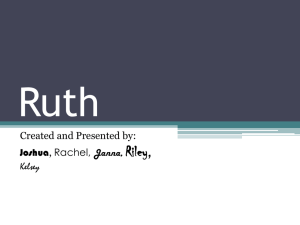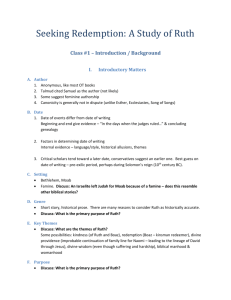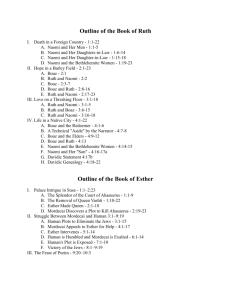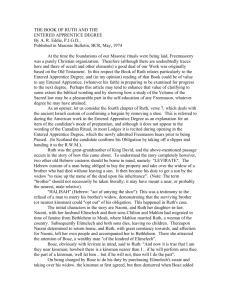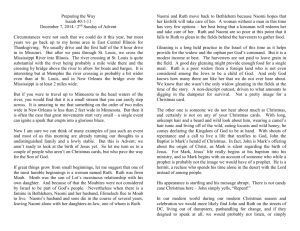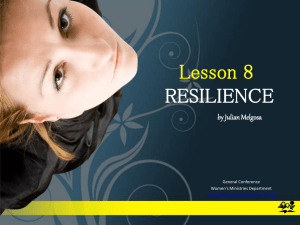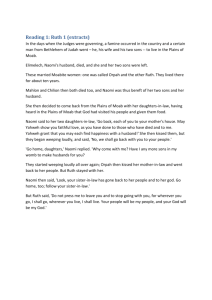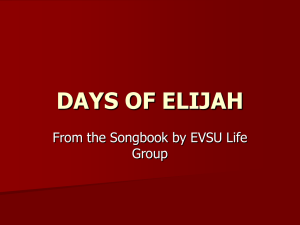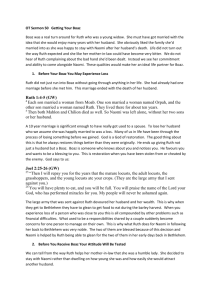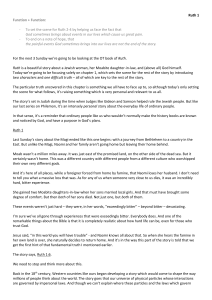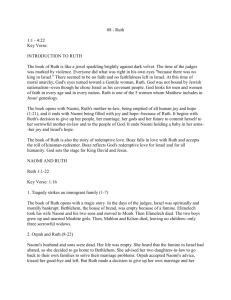File - Mountview Uniting Church
advertisement
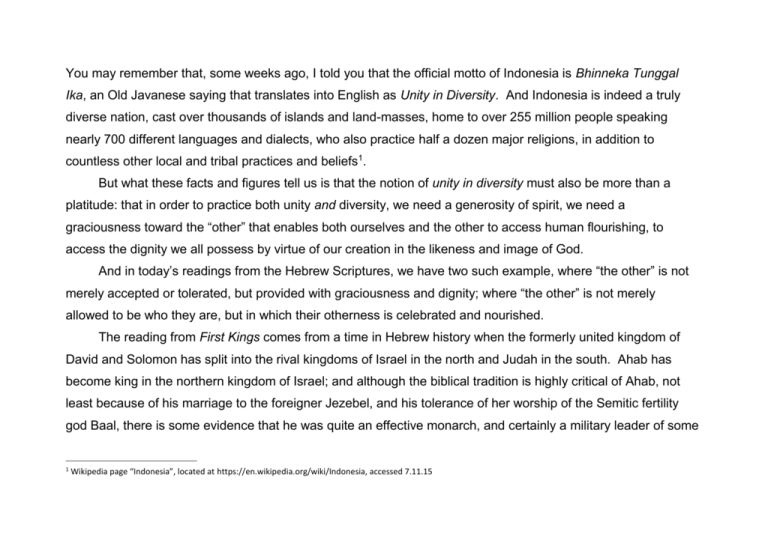
You may remember that, some weeks ago, I told you that the official motto of Indonesia is Bhinneka Tunggal Ika, an Old Javanese saying that translates into English as Unity in Diversity. And Indonesia is indeed a truly diverse nation, cast over thousands of islands and land-masses, home to over 255 million people speaking nearly 700 different languages and dialects, who also practice half a dozen major religions, in addition to countless other local and tribal practices and beliefs1. But what these facts and figures tell us is that the notion of unity in diversity must also be more than a platitude: that in order to practice both unity and diversity, we need a generosity of spirit, we need a graciousness toward the “other” that enables both ourselves and the other to access human flourishing, to access the dignity we all possess by virtue of our creation in the likeness and image of God. And in today’s readings from the Hebrew Scriptures, we have two such example, where “the other” is not merely accepted or tolerated, but provided with graciousness and dignity; where “the other” is not merely allowed to be who they are, but in which their otherness is celebrated and nourished. The reading from First Kings comes from a time in Hebrew history when the formerly united kingdom of David and Solomon has split into the rival kingdoms of Israel in the north and Judah in the south. Ahab has become king in the northern kingdom of Israel; and although the biblical tradition is highly critical of Ahab, not least because of his marriage to the foreigner Jezebel, and his tolerance of her worship of the Semitic fertility god Baal, there is some evidence that he was quite an effective monarch, and certainly a military leader of some 1 Wikipedia page “Indonesia”, located at https://en.wikipedia.org/wiki/Indonesia, accessed 7.11.15 standing2. Be that as it may, Elijah the prophet has been commissioned by God to prophesy to Ahab that a period of severe drought has come upon the kingdom; and God then instructs Elijah to take refuge in the desert, at an oasis called Wadi Cherith3. After spending some time there, Elijah is further instructed by God to travel far to the north, to the Phoenician town of Zarephath, which was near the large city of Sidon. A couple of things need to be noted here. The first is that this was the region of Phoenicia from which Jezebel, Ahab’s wife, came; Elijah is, as it were, in the heart of enemy territory. By placing Elijah in the very region from which Jezebel hails, the text is foreshadowing the future conflict between Elijah and the royal house over its sponsorship of the worship of Baal. It’s almost as though the writer of First Kings is saying: It doesn’t matter how many armies, or fortresses, or other forms of military power earthly kings obtain, God can still penetrate to the heart of their kingdoms, can still reach them despite their strength of arms4. The second point is that Elijah has been sent to a particular person in this region: a poor widow who doesn’t even have enough to feed herself and her son, never mind a stranger from a foreign land. Indeed, when we first encounter the widow, she is engaged in the tragic task of gathering enough firewood so that she can cook a final meal for herself and her son with their last, meagre stores of food. We are not told if their plight is a consequence of the ongoing drought; but, again, the fact that such desperate poverty is found in the very region 2 Wallace, Howard, “Year C: Pentecost 2 - 1 Kings 17:8-16 (17-24)”, located at http://hwallace.unitingchurch.org.au/WebOTcomments/OrdinaryC/Pent21Kgs17.html, accessed 7.11.15 3 Ibid. 4 Ibid. from which Jezebel comes implies that her worship of Baal – a fertility god - is fruitless; it is the God of Israel who will provide for those in need, not the lifeless idols which people venerate. And so it comes to pass. Elijah assures the widow and tells her not to be afraid; in instructing her to provide him with food and drink, he is not placing impossible burdens on someone who cannot possibly meet his demands. Rather, he is allowing her to access the generosity of God, who provides her with an extraordinary abundance that does not fail. But beyond this tale of the miraculous, we also have a story of different peoples and different cultures meeting; and the result of the meeting is not hostility or conflict, but a generosity of spirit that upholds the common unity of their human dignity. For although the widow and her son are Phoenicians, the same people to whom Elijah’s enemy Jezebel belongs, Elijah does not respond to the widow’s racial affiliation, and neither does he assume that her being different to him automatically makes her his enemy. Instead, he opens himself to trust – in God, and in his shared humanity with the widow – and is prepared to make himself vulnerable to both in order to exercise generosity and compassion. Rather than being a tale about the prophet’s power, this is a story about the vulnerability that trust requires, and the overflowing abundance that can result if we seek to embody God’s love for us all. And so it is also with today’s reading from Ruth. Ruth is also a foreign woman, from the land of Moab across the Jordan river. Her mother-in-law Naomi had fled with her family to Moab in order to escape a famine; but when Naomi’s husband and sons die, she returns to her native town of Bethlehem accompanied by Ruth, who had refused to be parted from her. Consequently, Ruth catches the eye of Naomi’s kinsman Boaz, who treats her kindly and allows her to gather the left behind husks which the reapers have failed to harvest from his wheat fields. But because she is poor, Naomi is still forced into a position where she has to sell a parcel of land her husband had owned; and it is not Boaz, but another relative who has the first right to purchase this land. This other relative, however, gives up the right to purchase this land and allows Boaz to buy it from Naomi instead. But in doing so, Boaz does not merely come into possession of the land: he also assumes responsibility for Ruth and for Naomi. And so Boaz declares that he will become Ruth’s husband and protector, and will look after Ruth and Naomi both. The effect of this is that Naomi, an unmarried widow, and Ruth, a widowed foreigner, have been taken out of a position of economic vulnerability and poverty, and placed in a situation of security and acceptance within the community. These days, we might bristle at the patriarchal nature of this story, in which a woman’s economic and personal dignity and security are dependent upon the actions of men. But if we look beyond this, we see that what today’s passage from Ruth actually provides us with is an understanding of economics in which the purpose of an economy is not to merely exist as a platform to be manipulated by the powerful and the wealthy. Rather, this is an understanding of economics that harks back to the original, theological definition of the word economy: one that describes a system of relationships, which exist for the common good rather than for individual profit. And one of these relationships is the relationship of responsibility. For the ancient Hebrews, acquiring land is not merely a matter of taking an asset off someone else’s hands; it is to ensure the other person is not left destitute as a result. In other words, the purchaser bears an ongoing responsibility to the seller, especially if the sale was made in circumstances of financial hardship. To acquire an asset is not merely to engage in an exchange of goods for money; it is to have entered into a relationship, a relationship that carried responsibilities and obligations. And from these responsibilities and obligations come blessings. Technically speaking, Boaz did not owe any obligations to Ruth; she may have been related to Naomi by marriage, but there was no other relationship tying her to Boaz. Furthermore, it was Naomi who sold the land to Boaz, and to whom he owed an ongoing obligation, and not Ruth. But like Elijah with the Phoenician woman, Boaz displays toward the Moabite woman Ruth a generosity of spirit that goes beyond strict legal or kinship obligations. Rather, Boaz refuses to see Ruth as “one of them”, as a Moabite or a “foreigner”, as someone who is not “one of us”. On the contrary, he draws her into an economy of grace, an economy of friendship and community. In doing so, he embodies the relational love which God has for humanity, and which God, through covenant with the Hebrew people, commands us to extend to one another. And from the blessing of that generosity come additional blessings, blessings hinted at in the praise to God which the women of Bethlehem sing for Naomi’s benefit. Through the generosity of love, Naomi and Ruth have been restored to positions of security and dignity; and this love is but a foreshadowing of that love by which the people of Israel will be restored, through a line of descendants who will lead one day to David, Israel’s greatest king. And it is from David’s house that Christian tradition declares springs the redeemer of all creation, Jesus of Nazareth. And so we celebrate the blessing which we gather today to enact: the commissioning of Pastor Minh as the Leader of the Vietnamese Faith Community at Mountview. Like drought-stricken Israel, like the poor widow, like economically vulnerable Ruth, the Vietnamese Faith Community has gone through difficult times in the last year or so. After losing their initial leader, John, they have coped with uncertainty and an unpredictable future; indeed, there have been times when we at Mountview have wondered if the community would survive. But through the faithfulness of its members, through the leadership displayed by Vanessa, through the support and assistance of Rev. Hung Ly and the Footscray community, they have now come through to a stage when they can look once more to the future with hope and expectation. The arrival of Pastor Minh to take up the reins of leadership is like the blessing which Elijah bestowed upon the poor widow, and the care which Boaz displayed toward Ruth: it makes the future possible again, it brings life and potential where there was once struggle and despair. And so it is that today’s readings reflect the reality of the Vietnamese Faith Community at Mountview; and, indeed, of the whole church. We are each of us different in many ways; and in many ways we are strange and foreign to each other. But God calls us to be sisters and brothers in Christ together, to live and work together, to bestow upon one another the dignity and grace that God has gifted to all of us through our shared humanity. We are called to see each other, not as “the other”, but as diverse and yet unified inheritors of a common legacy, the legacy of God’s love in Christ. And though we might travel through times of hardship and difficulty, if we undertake that journey together, trusting one another with all the vulnerability and hope that trust requires, then we will discover the abundance of God’s love – we will, one day, find ourselves unexpectedly and against all odds, in the unlimited space of God’s blessing, in a space where we all stand together as the loved children of God.
